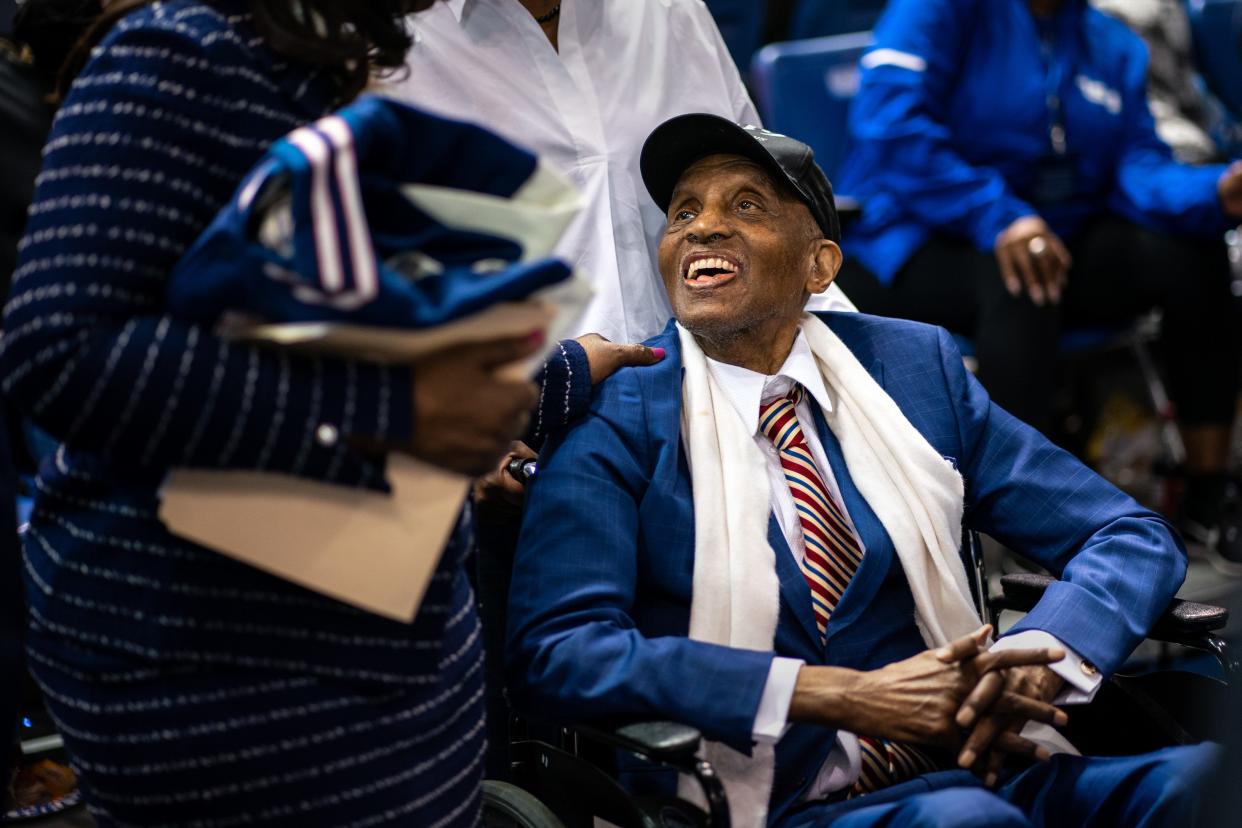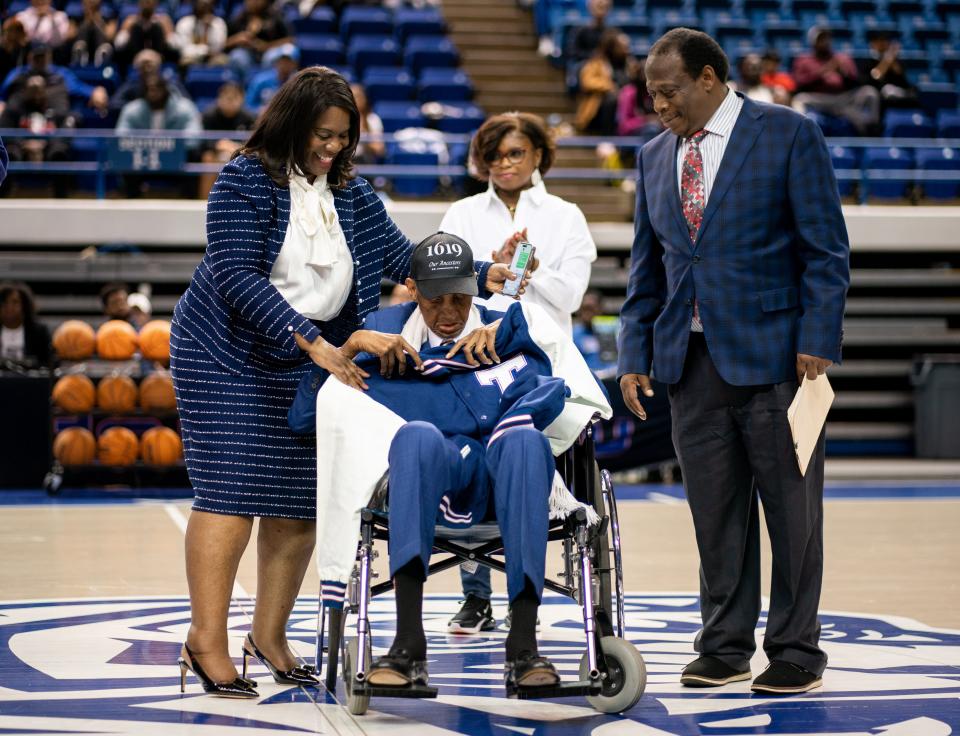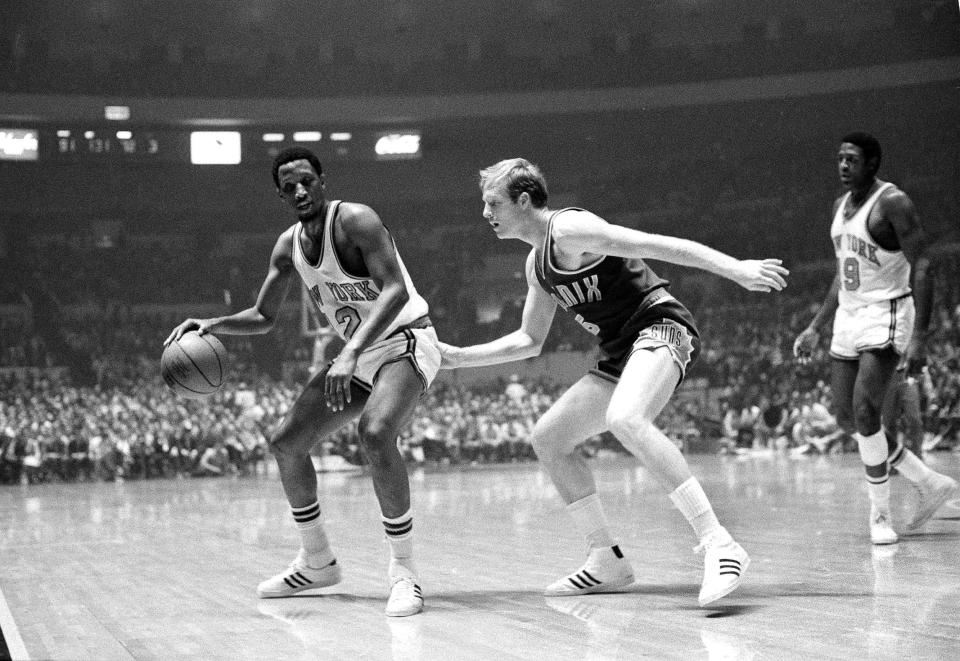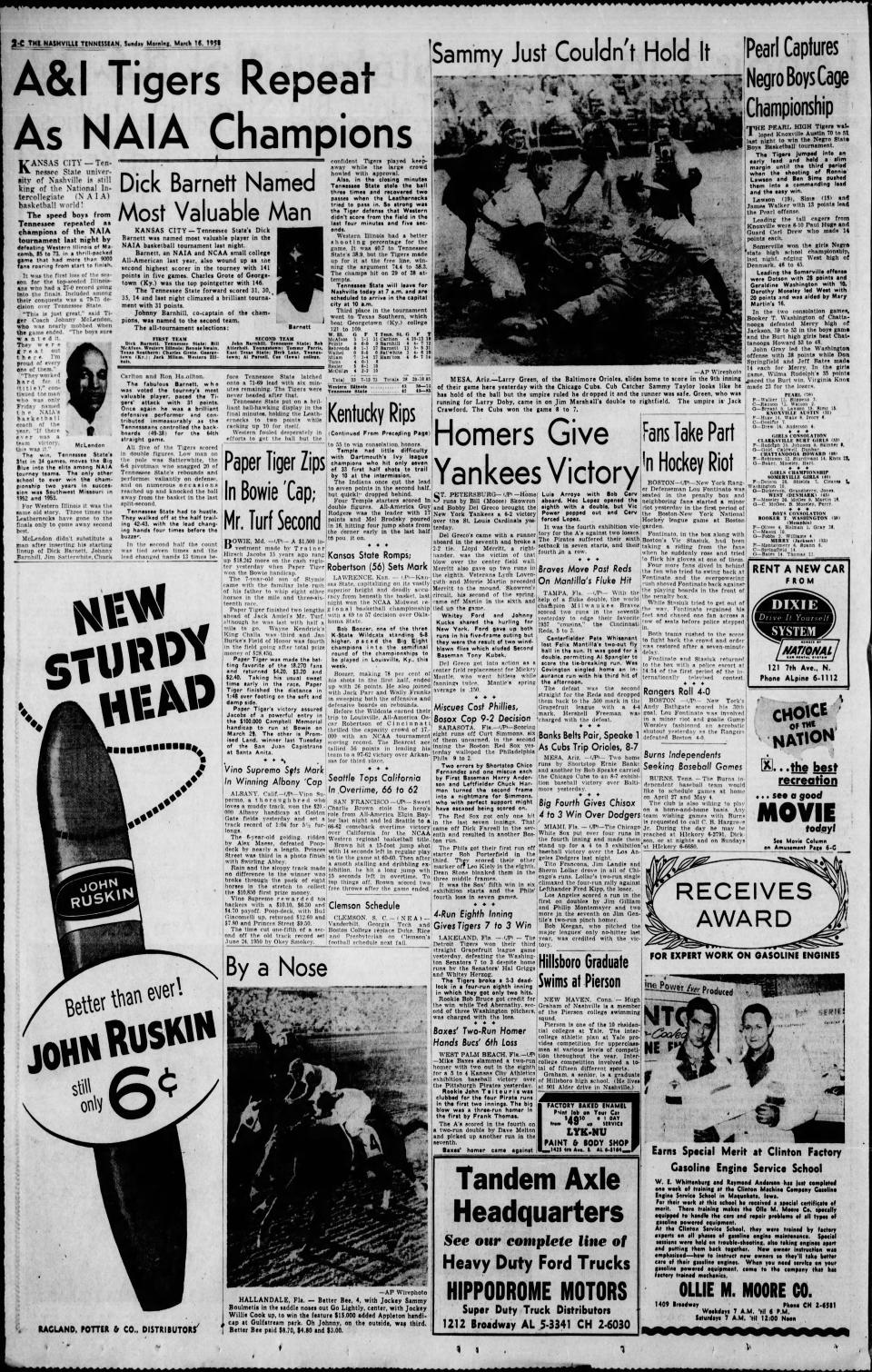This TSU star helped make Nashville 'center of Black basketball in America' in the 1950s

- Oops!Something went wrong.Please try again later.
He dreamed his way off the harsh streets of Gary, Indiana.
"That's where dreams come from," Dick Barnett said.
Barnett's life trajectory began with basketball, moved to Nashville's Tennessee State University, stretched into civil rights, leaped into education and, now that he's 86 years old, has a chance of returning to basketball — he's nominated as an individual to the Naismith Memorial Basketball Hall of Fame.
Currently, he's dreaming about the chance that a movie about his journey could be screened at the White House, at Historically Black Colleges and Universities across America and on streaming services in millions of homes.
This weekend, Barnett is being honored at TSU with the third-ever screening of "Dream Whisperer," a story that culminates with his effort to get his college basketball teams from 1957, 1958 and 1959 (three consecutive NAIA national titles) recognized as a group by the Naismith Memorial Basketball Hall of Fame. He was honored last week at the men's basketball game, and he spoke to TSU students.
"What I will tell the students will be profound," Barnett said before he was honored at halftime of TSU's game against Southeast Missouri.
He planned to tell them the details of his life, which include attending college in segregated Nashville. "The safest place for us (Black students) was Tennessee State," he said. "You didn't want to go downtown.
"Nashville was a country town, not cosmopolitan like it is now. It had dirt roads. It had the KKK."
When his team won the first of its three national championships, there was a bomb scare on the plane. It was believed to have been racially motivated.
"We had to de-plane when the police came," Barnett said.

He loves to talk about his college years, and he lobbied hard for his TSU teams to be recognized for the Hall of Fame. They had to overcome so much. For road games, they had to stay in the homes of Black families or dilapidated hotels that served Blacks.
Spoiler alert: His efforts were successful in 2019. Barnett, who played in the NBA with the Lakers and the Knicks, will find out on April 1 if he, personally, will be honored in the Hall of Fame. The Hall takes into account all levels of basketball, not just the NBA.
"It's disgraceful that he hasn't been inducted," said Steve Baumley, executive director for the Dick Barnett Foundation. "He's more than well-deserving. I feel very optimistic about this year."
Neighborhood dreamers in Indiana

Barnett wasn't the only dreamer from his neighborhood.
There was a kid down the block who liked to run and jump over trash cans and dreamed about being an Olympic champion. His name was Lee Calhoun. He won gold medals in the 110-meter hurdles in the 1956 and 1960 Olympic Games.
There was a guy up the block who worked in a steel mill. He dreamed about his family becoming world famous entertainers.
His name was Joe Jackson — he worked in the steel mill with Barnett's father.
Jackson's children became, well, a bit more famous than anyone dreamed.
Barnett learned about basketball on those Gary streets, where he became adept at tossing ping pong balls into tin cups.
He developed a jump shot in which he kicked his feet up behind him. The shot was as unusual as it was lethal. He was such a good shooter, he would tell defenders and teammates, "Too late. Fall back, baby," when he rose up for a shot. (To opposing players: It's too late to stop him from making this jump shot. And to teammates: Don't worry about rebounding a miss. It's going in. Just get back on defense.)
At Roosevelt High School, Barnett led his team to the Indiana State Championships where they eventually lost in the finals to Crispus Attucks High School, led by superstar Oscar Robertson.
Recruited to Tennessee State, Nashville
He was recruited by coach John McClendon, who learned the game from its creator, James Naismith. McClendon's TSU teams of the late 1950s petitioned the NCAA and the NIT for entry into those postseason tournaments. McClendon insisted that TSU be included, just as predominantly white teams were. If they were to participate, McClendon wanted them to stay in the same hotels and eat at the same restaurants.
When they were denied, TSU played in the NAIA tourney.
And they kept winning.

"We wanted to play against Bill Russell at the University of San Francisco," Barnett said.
Barnett didn't value education while he was at TSU.. Instead, he earned his bachelor's degree years later at Cal Poly Pomona.
In his book, "They Cleared the Lane: The NBA's Black Pioneers," author Ron Thomas wrote about Barnett's feelings about education in the 1950s.
"Obviously, my focus was basketball," Barnett said. "I didn't have the vision that (experience) brings to life. Life was just fun and games, and I was just interested in what happens tomorrow."
Author Andrew Maraniss, who researched TSU's historic basketball run in the late 50s for his book, "Strong Inside," said Nashville was "the center of Black basketball in America" in those years. And Dick Barnett was its biggest star.
"He represented a time during segregation where there was excellence at Black high schools and colleges (in Nashville) that was overlooked by the white media," Maraniss said.
Barnett, Maraniss said, found a way to persevere.
"It was certainly a dangerous time to be a Black young man," Maraniss said. "Dick Barnett is the best basketball player to come through Nashville ever."
Barnett was a first round pick in the 1959 NBA Draft and played 15 seasons. He won a championship with the Cleveland Pipers (owned by famed New York Yankees owner George Steinbrenner) of the American Basketball League in 1962.
He helped the New York Knicks win championships in 1970 and 1973. His jersey emblazoned by his familiar No. 12 was retired by the Knicks and hangs on display at Madison Square Garden.
He laughed when he recalled the money he made in those days. In his first three professional seasons, his annual salary (remember, he was the No. 1 pick in the draft) was $7,100. Eventually, he made as much as $100,000 per year.
"These guys today have basketball courts in the places where they live," he said. "They don't understand where we came from."
Barnett kept his NBA career in its proper perspective.
"Basketball was something that was a pillar of my getting an education," he said.
When he left professional basketball in 1973, he began work on his studies. He got a Ph.D. in education from Fordham University. Then he became a professor at St. John's University, where he taught Sports Management.
Talk about perspective
He loves to talk with young people about perspective.
States in the South "have not made the progress that other states have made" when it comes to racial equality, he said. "That history is still plaguing America, even though America has made some tremendous strides."
He said he likes to ask young people questions.
"I say to them, 'Where do you go from here?'" Barnett said. "Do you devote your life to service? Education? Politics" Finance? Religion?
"I have always rebelled against idea that we (Black athletes) could run and jump and play ball, but that we were not able to think."
The documentary film, "Dream Whisperer," directed by Eric Drath, tells the story of Barnett's nine-year quest to prove his college teams were worthy of basketball immortality. Hall of Famers Bill Bradley, Phil Jackson and Julius Erving appear in the film.
"We need to reiterate the story," Barnett said.
It's what dreams are made of.
Reach Keith Sharon at ksharon@tennessean.com.
This article originally appeared on Nashville Tennessean: Dick Barnett: Meet the Nashville basketball star you've never heard of

